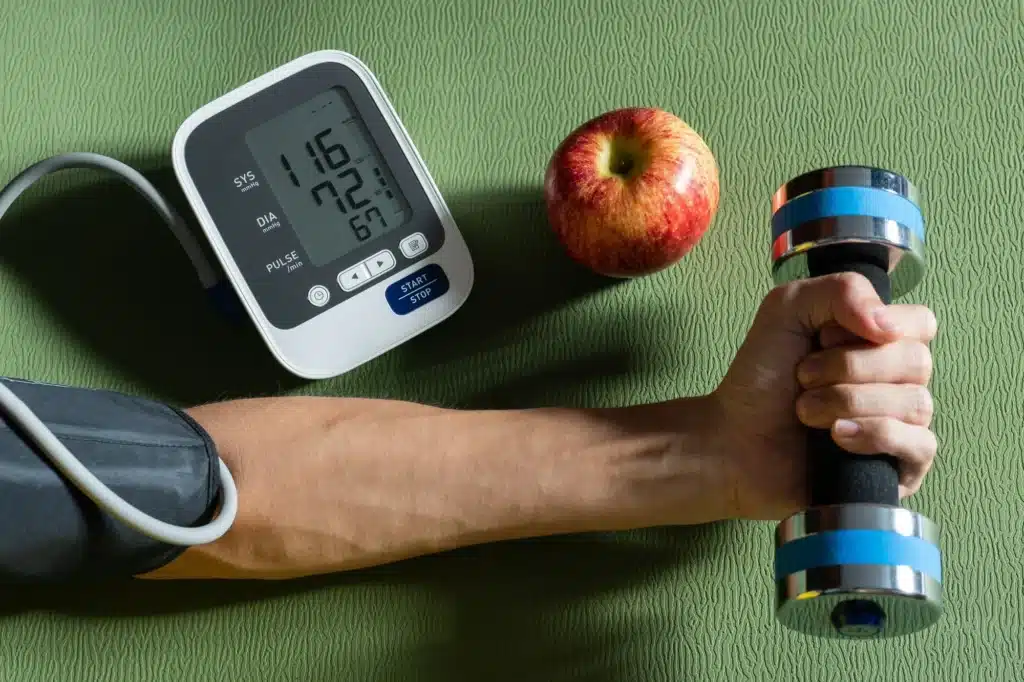Introduction
Can Bodybuilding Cause High Blood Pressure: Bodybuilding, a popular fitness pursuit aimed at sculpting a muscular and powerful physique, has garnered a massive following worldwide. While it offers numerous health benefits, including improved strength, endurance, and body composition, there is an ongoing debate regarding its potential impact on blood pressure. High blood pressure, or hypertension, is a concerning health condition associated with an increased risk of cardiovascular diseases and other serious health issues. This concern has led many to question whether the pursuit of massive muscle gains and extreme physical exertion in bodybuilding can inadvertently contribute to elevated blood pressure levels.
The relationship between bodybuilding and high blood pressure is a complex and multifaceted one, influenced by various factors, including genetics, training intensity, diet, and anabolic steroid use. Understanding this relationship is crucial for both fitness enthusiasts and healthcare professionals, as it can impact the long-term health and well-being of individuals engaged in bodybuilding practices. In this exploration, we will delve into the intricate connections between bodybuilding and hypertension, examining the potential causes and effects while highlighting strategies to promote cardiovascular health within the bodybuilding community.
Bodybuilding, with its emphasis on muscle hypertrophy and strength development, often involves rigorous training regimens and dietary practices that can significantly alter the body’s physiology. While there is a consensus that regular physical activity is essential for cardiovascular health, concerns arise when bodybuilders engage in extreme training and nutritional practices, which can potentially lead to high blood pressure.

Can Bodybuilding Cause High Blood Pressure?
Yes, bodybuilding can potentially cause high blood pressure, but it depends on several factors and how individuals approach their training, diet, and overall lifestyle. Training Intensity: Intense resistance training, especially with heavy weights and low rest periods, can lead to temporary spikes in blood pressure during workouts. Over time, if such intensity becomes chronic and if rest and recovery are inadequate, it can contribute to sustained high blood pressure.
Dietary Choices: Bodybuilders often follow high-protein, low-carbohydrate diets, which can sometimes result in increased sodium intake. This dietary pattern can affect blood pressure, especially if sodium intake is not balanced.
Supplements: Certain supplements commonly used in bodybuilding, such as creatine, can lead to water retention, potentially impacting blood pressure regulation.
Anabolic Steroids: The use of anabolic steroids, which is prevalent in some bodybuilding circles, can significantly raise the risk of hypertension. These substances can disrupt hormonal balance and have adverse effects on cardiovascular health.
Genetics: Individual genetic predispositions also play a role. Some people may be more susceptible to high blood pressure due to their family history and genetics.
To mitigate the risk of high blood pressure in bodybuilding:
Monitor Blood Pressure: Regularly check your blood pressure and consult with a healthcare professional for guidance.
Balance Training Intensity: Incorporate periods of lower-intensity training and adequate rest into your routine to reduce the chronic stress on the cardiovascular system.
Optimize Diet: Maintain a balanced diet that includes adequate nutrients and keeps sodium intake in check.
Avoid Performance-Enhancing Drugs: Steer clear of anabolic steroids and other substances that can harm cardiovascular health.
Does bodybuilding cause high blood pressure?
While bodybuilding itself doesn’t inherently cause high blood pressure, several factors associated with this intense form of physical training can contribute to elevated blood pressure levels.
It’s essential to understand these factors and their potential impact:
Intense Resistance Training: Bodybuilders often engage in intense resistance training routines, involving heavy weights and low-repetition, high-load exercises. During these workouts, blood pressure can temporarily spike due to the physical exertion required to lift significant weights. This increase in blood pressure is generally a short-term response to the body’s increased demand for oxygen and nutrients during exercise.
Dietary Choices: Many bodybuilders follow high-protein, low-carbohydrate diets to support muscle growth and fat loss. While protein is essential for muscle recovery and growth, some protein-rich foods naturally contain sodium. Excessive sodium intake can lead to water retention and may affect blood pressure regulation.
Supplement Use: Supplements are commonly used in the bodybuilding community to enhance performance and muscle development. Some supplements, like creatine, can lead to temporary water retention, which might affect blood pressure in the short term.
Anabolic Steroids: The use of anabolic steroids is a significant concern in the bodybuilding community. Anabolic steroids can lead to hormonal imbalances, including increased levels of adrenaline and aldosterone, both of which can raise blood pressure. Additionally, steroids may promote the development of atherosclerosis, which narrows the arteries, further increasing the risk of hypertension and other cardiovascular issues.
Genetics and Individual Variations: Genetics also play a role in an individual’s susceptibility to high blood pressure. Some individuals may have a genetic predisposition to hypertension, regardless of their involvement in bodybuilding or their lifestyle choices.
To address these potential risks and promote cardiovascular health within the bodybuilding community, it’s crucial for individuals to:
- Monitor blood pressure regularly to track any changes.
- Incorporate balanced training routines with adequate rest and recovery.
- Maintain a healthy diet, focusing on a well-rounded nutritional plan that moderates sodium intake.
- Stay well-hydrated, especially when using supplements that may lead to water retention.
- Strongly avoid the use of performance-enhancing drugs, particularly anabolic steroids, which pose significant cardiovascular risks.
What strategies can bodybuilders employ to reduce the risk of high blood pressure?
To mitigate the risk, bodybuilders should monitor blood pressure regularly, incorporate balanced training and nutrition, stay hydrated, and avoid performance-enhancing drugs, especially anabolic steroids.
Regular Blood Pressure Monitoring: Bodybuilders should make routine blood pressure checks a standard part of their health regimen. Regular monitoring enables early detection of any changes or spikes in blood pressure, allowing for timely intervention if necessary. This proactive approach to health can help prevent the development of chronic hypertension.
Balanced Training: Incorporating balanced training practices is essential. While intensity is a key element of bodybuilding, it’s crucial to include periods of lower-intensity workouts and ensure adequate rest between intense sessions. Overtraining can lead to chronic elevations in blood pressure. By allowing the body to recover, individuals can reduce the stress on their cardiovascular system and minimize the risk of high blood pressure.
Nutritious Diet: Nutrition plays a pivotal role in managing blood pressure. Bodybuilders should aim for a well-rounded diet that includes essential nutrients while being mindful of sodium intake. A diet rich in fruits, vegetables, lean proteins, whole grains, and healthy fats can help support cardiovascular health. Reducing processed and high-sodium foods is beneficial in maintaining lower blood pressure levels.
Hydration: Staying well-hydrated is essential for overall health and can help regulate blood pressure. Dehydration can lead to increased sodium concentrations in the blood, potentially affecting blood pressure. Bodybuilders should consume an adequate amount of water throughout the day, especially when using supplements that may cause water retention.
Avoidance of Performance-Enhancing Drugs: One of the most critical steps in reducing the risk of high blood pressure in bodybuilding is avoiding the use of performance-enhancing drugs, with a particular emphasis on anabolic steroids. Anabolic steroids can lead to hormonal imbalances and cardiovascular side effects, significantly increasing the risk of hypertension and other cardiovascular diseases. Opting for natural and safe bodybuilding practices is not only healthier but also more sustainable in the long term.
Are dietary choices important in bodybuilding-related high blood pressure?
Dietary choices are significant. High-protein, low-carbohydrate diets common in bodybuilding may increase sodium intake, which can affect blood pressure regulation .Excessive sodium intake is associated with water retention, which can potentially affect blood pressure regulation. The body retains more fluid to balance the increased sodium concentration, and this can lead to elevated blood pressure, at least temporarily.
To mitigate the impact of dietary choices on blood pressure, bodybuilders can take the following steps:
Balanced Diet: Aim for a well-rounded diet that includes not only protein but also a variety of fruits, vegetables, lean meats, whole grains, and healthy fats. This balanced approach helps provide essential nutrients while moderating sodium intake.
Sodium Awareness: Pay attention to sodium content in foods and try to choose lower-sodium options whenever possible. Avoid excessive salt use in cooking and consider using herbs and spices to flavor meals instead.
Hydration: Staying well-hydrated can help with sodium balance in the body. Adequate water intake can help flush out excess sodium and maintain blood pressure within a healthy range.
Monitoring: Regularly monitoring blood pressure is essential to track any changes and identify potential issues early. This allows for timely adjustments in dietary choices if necessary.
How does intense resistance training affect blood pressure in bodybuilders?
Intense resistance training can cause temporary spikes in blood pressure during workouts due to the physical exertion involved in lifting heavy weights.
When individuals engage in intense resistance training, such as lifting heavy weights or performing high-intensity repetitions, their muscles require more oxygen and nutrients to meet the increased demand for energy. To deliver these essential resources, the heart must pump blood more vigorously, which leads to a rise in blood pressure.
The body’s immediate response to intense resistance training is an increase in systolic blood pressure, which is the highest number in a blood pressure reading. This is because the heart contracts more forcefully to pump blood into the muscles, providing them with the necessary oxygen and nutrients.
During intense resistance training, there is a process known as the Valsalva maneuver. This involves holding one’s breath and tensing the abdominal muscles to stabilize the core while lifting heavy weights. The Valsalva maneuver can further raise blood pressure by increasing intra-abdominal pressure.
Can supplements used in bodybuilding impact blood pressure?
Yes, some supplements like creatine can lead to water retention, which may affect blood pressure in the short term. Creatine is a popular and widely used supplement in the bodybuilding community. It is known for its ability to enhance muscle strength and performance. Creatine achieves this by increasing the availability of adenosine triphosphate (ATP), a molecule that provides energy for muscle contractions.
However, one potential side effect of creatine supplementation is water retention, also known as fluid retention or edema. Creatine can draw water into muscle cells, resulting in an increase in overall body water content. This water retention can be particularly noticeable in the initial phases of creatine supplementation.
The increased body water content, while typically temporary, can have a short-term effect on blood pressure. An increase in blood volume, as a result of water retention, can contribute to a slight elevation in blood pressure. This elevation is generally modest and temporary, and it often resolves as the body adapts to the increased water content.
How can bodybuilders mitigate the risk of high blood pressure?
Monitoring blood pressure regularly, incorporating balanced training and rest, maintaining a healthy diet, and avoiding performance-enhancing drugs are key strategies to manage cardiovascular health and reduce the risk of high blood pressure in bodybuilding.
Certainly, here’s a more detailed explanation of how bodybuilders can mitigate the risk of high blood pressure by following these key strategies:
Regular Blood Pressure Monitoring: One of the fundamental steps bodybuilders can take is to monitor blood pressure regularly. Routine blood pressure checks enable individuals to track any changes and detect potential issues early. This proactive approach allows for timely interventions if necessary, helping prevent the development of chronic hypertension.
Balanced Training: Incorporating balanced training routines is essential. While intensity is a crucial aspect of bodybuilding, it’s equally important to include periods of lower-intensity workouts and ensure adequate rest and recovery between high-intensity sessions. Overtraining without proper recovery can lead to prolonged elevations in blood pressure. Balancing intensity with adequate rest helps reduce this risk.
Healthy Diet: Maintaining a nutritious diet is crucial for managing blood pressure. Bodybuilders should focus on a well-rounded diet that includes essential nutrients while being mindful of sodium intake. A diet rich in fruits, vegetables, lean proteins, whole grains, and healthy fats supports cardiovascular health. Reducing processed and high-sodium foods is also beneficial.
Hydration: Staying well-hydrated is important for overall health and can aid in blood pressure regulation. Proper hydration helps balance the effects of sodium intake and supports normal blood volume. This is particularly relevant when using supplements that may cause water retention.
Avoidance of Performance-Enhancing Drugs: One of the most critical steps in reducing the risk of high blood pressure in bodybuilding is avoiding the use of performance-enhancing drugs, especially anabolic steroids. These substances can lead to hormonal imbalances and cardiovascular side effects, significantly increasing the risk of hypertension and other cardiovascular diseases. Opting for natural and safe bodybuilding practices is not only healthier but also more sustainable in the long term.

Conclusion
The relationship between bodybuilding and high blood pressure is a complex and multifaceted one. While bodybuilding itself does not inherently cause high blood pressure, several factors associated with this intense form of physical training can contribute to elevated blood pressure levels. These factors include intense resistance training, dietary choices, supplement use, and the use of performance-enhancing substances like anabolic steroids.
However, it’s crucial to recognize that not all individuals engaged in bodybuilding will develop high blood pressure. Genetics and individual variations play a significant role in determining susceptibility to hypertension. Therefore, managing cardiovascular health in bodybuilding involves a combination of proactive measures.
Regular blood pressure monitoring, balanced training, a healthy diet, proper hydration, and the avoidance of performance-enhancing drugs, particularly anabolic steroids, are key strategies for mitigating the risk of high blood pressure. By adopting a holistic approach to training and lifestyle, bodybuilders can promote their long-term cardiovascular well-being while continuing to pursue their fitness goals in a safe and sustainable manner.

